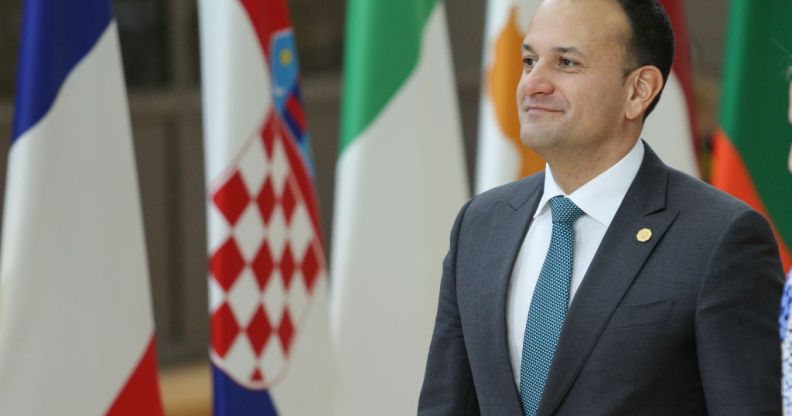Ireland’s ex-taoiseach Leo Varadkar faces calls to be sacked from government after admitting confidential document leak

Irish leader Leo Varadkar (Photo by Nicolas Economou/NurPhoto via Getty Images)
Leo Varadkar, Ireland’s tánaiste (deputy leader), is facing significant backlash after it was alleged he leaked a confidential government document to a friend in April 2019.
The hashtags “sack Varadkar”, “Leogate” and “Leo the leak” were all trending on Monday (November 2) after details of the leak were first reported by Village magazine on Saturday (October 31).
In its article, Village magazine alleged that Varadkar possibly broke the law as taoiseach (prime minister), when he shared details of a government agreement with the Irish Medical Organisation (IMO) with Dr Maitiú Ó Tuathail, a personal friend.
At that time, Ó Tuathail was president of the National Association of General Practitioners, another medical union that has since been dissolved.
The magazine claimed that Varadkar’s actions may have been illegal under the Criminal Justice (Corruption Offences) Act. Varadkar has strenuously denied that he broke the law.
Ireland’s politicians have questioned why Leo Varadkar leaked a confidential document to a personal friend.
Leo Varadkar has faced significant criticism from rival political parties, with Aodhán Ó Ríordáin of the Irish Labour party telling RTÉ Radio 1 that the former taoiseach will need to answer difficult questions.
“We want the tánaiste to answer as to why he stepped into a process that he had no involvement with and handed a document on which was stamped ‘confidential, not for circulation’, to a friend of his.
“This is not the way that business should be done,” he added.
“What’s more important in Ireland today? Is it that you’re a registered negotiating entity or is it more important that you have the phone number of Leo Varadkar?”
Meanwhile, David Cullinane of Sinn Féin told RTÉ’s This Week: “I don’t think that it is acceptable that the tánaiste is hiding behind lame excuses.
“The facts for me here are clear – Leo, as the leader of Fine Gael and taoiseach at the time, passed on a document to a friend about sensitive negotiations involving hundreds of millions of euro of taxpayers’ money.”
Cullinane suggested Varadkar “knows in his heart that this was wrong” and said he should “come clean and accept that”.
Eoin Ó Broin of Sinn Féin said on Monday: “I think it’s deeply disappointing that senior Fine Gael ministers have spent the last two days trying to brush this matter under the carpet.
“You had the minister for finance yesterday suggesting that this was a document that was shared. It wasn’t shared, even leaked probably isn’t a strong enough word. This was a scandalous breach both of negotiating protocol but also of trust and faith by the then taoiseach.”
Varadkar admitted in a statement over the weekend that his actions were not “best practice” and said it “could have been done differently”. However, he also insisted that the story in Village magazine was “both inaccurate and grossly defamatory”. He is expected to address the controversy in Dáil Eireann, Ireland’s parliament, on Tuesday (November 3).
Meanwhile, Ireland’s leader Michéal Martin told reporters in Dublin on Monday that he had confidence in Varadkar, but admitted that his decision to leak the document was “not best practice”.
Varadkar has faced a storm of criticism on social media, with many people calling for him to be removed from his position over the leak.
We'll see how important accountability is to Varadkar now, corrupt git.#SackVaradkar https://t.co/Uvcf9CTI8u
— Conchubhar Ó'Raghallaigh (@ConorJonOReilly) November 2, 2020
I believe that Leo Varadkar is clearly in breach of both the Codes of Conduct for TDs and the Code of Conduct for Office Holders.
I have written to SIPO outlining the breaches and asking them to investigate.#LeoTheLeak https://t.co/IABIs1rDQ6— Paul Murphy (@paulmurphy_TD) November 2, 2020
I don’t think Leo Varadkar “leaked” an agreement in the public interest. That’s nonsense. He gave his friend a heads up and something that was valuable in helping that friend to build credibility and demonstrate political influence to his membership. It’s as simple as that.— Glenna Lynch (@Glenna_lynch) November 1, 2020
Leo Varadkar became Ireland’s first gay leader when he took the top position in 2017.
Leo Varadkar made history when he became Ireland’s first ever gay taoiseach in 2017 as the leader of Fine Gael.
After losing seats in the 2020 general election, Varadkar’s party brokered a deal with Fianna Fáil and the Green Party to enter into a three-party coalition.
Under the terms of the agreement, Varadkar will serve as deputy leader until December 2022, at which point he will become taoiseach again for the second half of the government’s lifespan.
Varadkar came out publicly as gay ahead of Ireland’s marriage equality referendum in 2015 during an interview on RTÉ Radio 1.
PinkNews has contacted the Department of Enterprise, Trade and Employment for comment.

